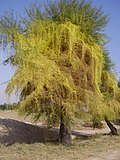Parasitic plant
Parasitic plants are a type of plant that derive some or all of their nutritional requirements from another living plant. They make up about 1% of angiosperms and are in almost every biome in the world. All parasitic plants have modified roots, called haustoria, which penetrate the host plant, connecting them to the conductive system - either the xylem, the phloem, or both.
Classification[edit]
Parasitic plants are classified into two groups based on the location of the haustoria: stem parasites and root parasites. Stem parasites, such as Cuscuta and Cassytha, are usually found in the tropics and have haustoria that penetrate the stem of the host plant. Root parasites, such as Orobanche and Striga, are found worldwide and have haustoria that penetrate the roots of the host plant.
Life Cycle[edit]
The life cycle of a parasitic plant is similar to that of other plants, with a few key differences. The seed of a parasitic plant is often small and lightweight, allowing it to be easily dispersed by wind or animals. Once the seed lands on a suitable host, it germinates and the haustorium penetrates the host plant. The parasitic plant then begins to absorb nutrients from the host, growing and eventually producing its own seeds.
Impact on Agriculture[edit]
Parasitic plants can have a significant impact on agriculture, particularly in developing countries. They can reduce crop yields, cause crop failure, and increase the cost of farming. Some parasitic plants, such as Striga, are considered major pests in Africa, causing significant damage to crops such as maize and sorghum.
Control Methods[edit]
Control methods for parasitic plants include cultural practices, chemical control, and biological control. Cultural practices include crop rotation and the use of resistant varieties. Chemical control involves the use of herbicides, while biological control involves the use of natural enemies of the parasitic plant.
See Also[edit]
This plant related article is a stub. You can help WikiMD by expanding it.
-
Cuscuta parasite plant
-
Rafflesia arnoldii, Sumatra
-
Mistletoe
-
Striga root connections
-
Sarcodes sanguinea
Ad. Transform your life with W8MD's Budget GLP-1 injections from $49.99


W8MD offers a medical weight loss program to lose weight in Philadelphia. Our physician-supervised medical weight loss provides:
- Weight loss injections in NYC (generic and brand names):
- Zepbound / Mounjaro, Wegovy / Ozempic, Saxenda
- Most insurances accepted or discounted self-pay rates. We will obtain insurance prior authorizations if needed.
- Generic GLP1 weight loss injections from $49.99 for the starting dose of Semaglutide and $65.00 for Tirzepatide.
- Also offer prescription weight loss medications including Phentermine, Qsymia, Diethylpropion, Contrave etc.
NYC weight loss doctor appointmentsNYC weight loss doctor appointments
Start your NYC weight loss journey today at our NYC medical weight loss and Philadelphia medical weight loss clinics.
- Call 718-946-5500 to lose weight in NYC or for medical weight loss in Philadelphia 215-676-2334.
- Tags:NYC medical weight loss, Philadelphia lose weight Zepbound NYC, Budget GLP1 weight loss injections, Wegovy Philadelphia, Wegovy NYC, Philadelphia medical weight loss, Brookly weight loss and Wegovy NYC
|
WikiMD's Wellness Encyclopedia |
| Let Food Be Thy Medicine Medicine Thy Food - Hippocrates |
Medical Disclaimer: WikiMD is not a substitute for professional medical advice. The information on WikiMD is provided as an information resource only, may be incorrect, outdated or misleading, and is not to be used or relied on for any diagnostic or treatment purposes. Please consult your health care provider before making any healthcare decisions or for guidance about a specific medical condition. WikiMD expressly disclaims responsibility, and shall have no liability, for any damages, loss, injury, or liability whatsoever suffered as a result of your reliance on the information contained in this site. By visiting this site you agree to the foregoing terms and conditions, which may from time to time be changed or supplemented by WikiMD. If you do not agree to the foregoing terms and conditions, you should not enter or use this site. See full disclaimer.
Credits:Most images are courtesy of Wikimedia commons, and templates, categories Wikipedia, licensed under CC BY SA or similar.
Translate this page: - East Asian
中文,
日本,
한국어,
South Asian
हिन्दी,
தமிழ்,
తెలుగు,
Urdu,
ಕನ್ನಡ,
Southeast Asian
Indonesian,
Vietnamese,
Thai,
မြန်မာဘာသာ,
বাংলা
European
español,
Deutsch,
français,
Greek,
português do Brasil,
polski,
română,
русский,
Nederlands,
norsk,
svenska,
suomi,
Italian
Middle Eastern & African
عربى,
Turkish,
Persian,
Hebrew,
Afrikaans,
isiZulu,
Kiswahili,
Other
Bulgarian,
Hungarian,
Czech,
Swedish,
മലയാളം,
मराठी,
ਪੰਜਾਬੀ,
ગુજરાતી,
Portuguese,
Ukrainian




